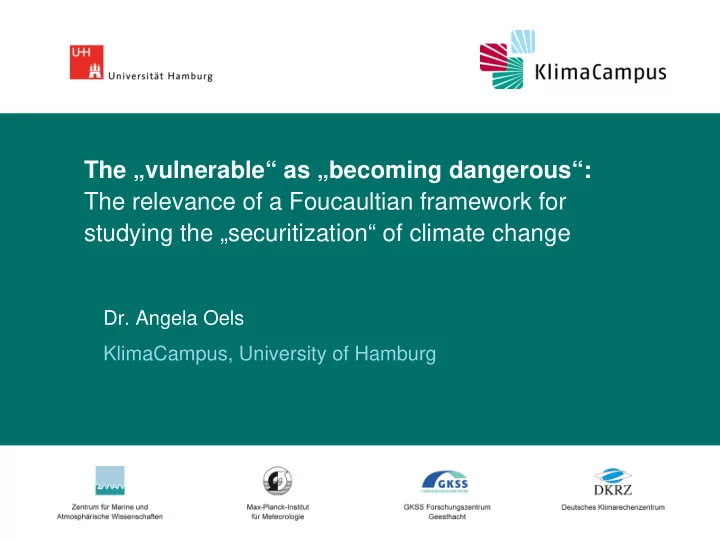

The „vulnerable“ as „becoming dangerous“: The relevance of a Foucaultian framework for Titelmasterformat durch Klicken bearbeiten studying the „securitization“ of climate change Dr. Angela Oels KlimaCampus, University of Hamburg
Research questions and hypothesis Research questions Is the articulation of climate change as a security issue related to a shift in international climate policy? What is the contribution of Foucault‘s biopolitical security dispositif to answering this question? Hypothesis: What others study as failed “securitization” is better understood as a form of routine liberal risk management that has rendered climate change governable from the beginning.
Outline of the presentation There is a continuity of a biopolitical risk management Different variants of this risk management have informed policymaking on • Mitigation • Adaptation • Migration management/Disaster preparedness Conclusions
1.Shifting meanings of the risk of „climate change“ Nature of the „threat“ Emission problem Technology of biopolitical risk management Mitigation
1.Shifting meanings of the risk of „climate change“ Nature of the „threat“ 2001 Emission problem Impact problem Technology of biopolitical risk management Mitigation Adaptation
1.Shifting meanings of the risk of „climate change“ Nature of the „threat“ 2001 2006 Emission problem Impact problem Security problem Technology of biopolitical risk management Mitigation Adaptation Refugee and conflict management
No.1 Probability-based risk management (Foucault): Trade Viruses Money Crime Terrorism Risk management secures the population by securing circulation from elements that pose a danger to the continuation of circulation.
No.1 Probability-based risk management (Foucault) Trade Viruses Money Crime Terrorism LESS MORE •Keep bad circulation at a „tolerable“ level. Maximise good circulation. •Target „risk groups“. Govern by regulation.
The threat of „excessive“ emissions: Mitigation as probability-based biopolitical risk management NORMAL The PROBLEM Fossil-fuel-based capitalist economy Excessive emissions causing climate change Keep greenhouse gas emissions at a Maximise economic growth. „tolerable“ level.
No.2 Risk management through contingency (Dillon) Trade Viruses Money Crime Terrorism Risks escape calculability. Securing the population by navigating contingency. Securing the population by enhancing the capacity to transform and regenerate.
The threat of „dangerous“ impacts of climate change: Adaptation in two forms of biopolitical risk management „Scientific framing“ (dominant) „Human security frame“ (marginalised) • Vulnerability= susceptibility to • Vulnerability = a product of reduced impacts of climate change access to entitlements • Adaptation= moderate or offset • Adaptation= enhance capability to damages of predicted impacts cope with change • Focus on technology • Focus on empowerment • Risk groups= vulnerable economic • Risk groups= currently disadvantaged sectors, regions and people groups
No.3 How „risk groups“ can be rendered governable as „dangerous“ (Bigo‘s ban-opticon) Secure the circulation of the Ban the few „dangerous“ masses The „risk groups“ can be marked as „dangerous“ to circulation.
The „securitization“ of climate change in Foucaultian perspective Routine biopolitical risk management of secondary climate change impacts • Keep disruptions at tolerable level • monitoring, forecasting and early warning systems • enhance disaster preparedness • plan for orderly resettlement • target interventions on risk groups (the vulnerable)
The „securitization“ of climate change in Foucaultian perspective Routine biopolitical risk management Risk groups as becoming of secondary climate change „dangerous“ impacts • Vulnerability indices can be • Keep disruptions at tolerable level developed further to project when the „vulnerable“ might be • monitoring, forecasting and early „becoming dangerous“ warning systems • „humanitarian“ interventions, • enhance disaster preparedness more border controls etc. could • plan for orderly resettlement be legitimated • target interventions on risk groups (the vulnerable)
Preliminary findings 1. Climate change has been rendered governable by the biopolitical security dispositif from the beginning. 2. The identified „threat“ posed by climate change has changed over time, so have the practices of risk management. 3. What others have analysed as (failed) „securitization“ of climate change is better understood as routine risk management of the secondary impacts of climate change. 4. Routine risk management can under certain conditions enable illiberal practices/sovereign power.
Recommend
More recommend